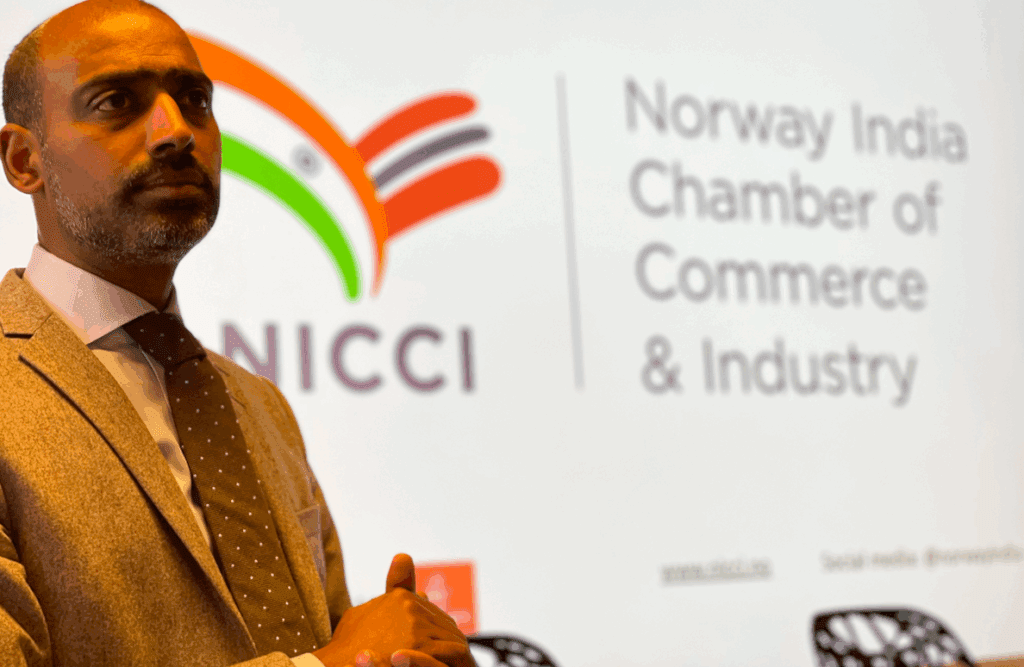At yesterday´s NICCI member meeting in Oslo, we were pleased to welcome Henrik Chetan Aspengren from the Swedish Institute of International Affairs (UI) for a timely deep dive into how India is perceived across the Nordics – and why those perceptions are due for a serious upgrade.

Henrik presented findings from his latest report, Diluting the partnership potential? Knowledge-gaps and views on India in Sweden, co-authored with Nicholas Olczak. The study is built on data from Sweden’s national SOM public opinion survey and offers a sobering insight: despite India’s growing global importance, public knowledge remains alarmingly low, and outdated assumptions persist. These gaps are not just academic – they are directly limiting the potential for deeper Nordic–India cooperation.
A rising power – still underestimated
India today is not only the world’s fifth-largest economy, but also an increasingly pivotal actor on the global stage. The country is central to the emerging multipolar world order, with growing influence in global governance, climate policy, technology, and international trade. European governments, including Sweden and Germany, are responding with renewed India strategies.
But Henrik’s research reveals a disconnect: the Swedish public still holds a narrow, often unclear view of India, shaped largely by media coverage that overemphasizes conflict and foreign policy – particularly India’s position on Russia’s war in Ukraine – while underreporting its innovation capacity, democratic complexity, and global leadership ambitions.
A standout data point: over 40% of Swedes answered “don’t know” when asked if Sweden should expand cooperation with India. Even among those who responded, only a third supported closer ties. While more people now recognize India as a future global actor, mixed or negative views on India’s responsibility on the world stage, its human rights record, and its value as an investment partner persist.
The Norway parallel – we share the same challenge
Though Henrik’s data is focused on Sweden, the discussion during our meeting quickly turned to Norway. The knowledge gap he identified likely mirrors the situation here.
As several participants pointed out, our perception of India in Norway is still often shaped by outdated books, articles or voices from people who despite good intentions – haven’t been able to keep up with the speed of India’s transformation. India today moves so fast that reading about it simply isn’t enough. The only way to gain a true, realistic understanding is to go there, meet people, and see it firsthand.
That’s why NICCI’s business delegations to India are more important than ever. Several members agreed that these trips are often game-changers in helping Norwegian professionals recalibrate their thinking and realize what business opportunities India really offers.
A real-world example: Kongsberg Maritime in Mumbai
A great example came from Annette Holte, NICCI board member and Country Manager for Kongsberg Maritime in India. Based in Mumbai, Annette shared how she is strategically using both personal and official company channels on social media to paint a more accurate and nuanced image of India – its energy, innovation, infrastructure and people.
She emphasized that active storytelling from those on the ground is a powerful tool to cut through outdated narratives. By showing day-to-day realities and successes, companies like Kongsberg Maritime are helping shift perceptions in a much more effective way than abstract reports or distant commentary.
This aligns perfectly with Henrik’s message: there’s a need not only for research-based insight, but also for concrete stories and visible Nordic presence in India.
Key takeaways from the report
Henrik’s report outlines several critical findings:
- Widespread uncertainty: A significant portion of the Swedish public feels uninformed about India, with “don’t know” being a common response across all survey questions
- Media plays a major role: India is underrepresented in Swedish media compared to other Asian nations, and reporting is skewed toward conflict and foreign policy
- Perception impacts cooperation: Ignorance and outdated images of India could slow down policy and business engagement, limiting strategic opportunities for both sides
- Room for change: While views are mixed, they’re not fixed. The high number of undecided respondents points to real potential for shifting public and business opinion
Read the full report here: Download “Diluting the Partnership Potential?” (PDF)
About Henrik Chetan Aspengren and PNIR
Henrik Chetan Aspengren is a researcher and senior analyst at the Swedish Institute of International Affairs (UI), working with various themes of politics and economics related to India and its growing global footprint. He leads the Project for Nordic–India Relations (PNIR). A trained historian with a Ph.D. from SOAS, University of London, Henrik combines deep academic insight with sharp policy analysis on India’s international role, democratic development, and global influence.
Through PNIR, Henrik convenes the annual Nordic–India Dialogue and works closely with both Nordic and Indian institutions to promote research-based cooperation. The PNIR project is open to collaboration with Nordic stakeholders across public, private, and academic sectors.
Interested in engaging with Henrik or learning more about PNIR?
Email: henrik.aspengren@ui.se
Phone: +46 708 986 797
Learn more about PNIR and explore insights under India and the World: ui.se/pnir
